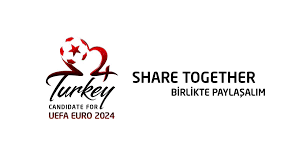By Andrew Warshaw
May 15 – The similarities are striking. Always the bridesmaid, never the bride. Up against a heavyweight rival. Eager to reward a football-mad nation with the ultimate prize. Just as underdogs and four-time losers Morocco are desperate to upset the odds and land the 2026 World Cup, so Turkey are equally determined to make up for lost time and hold the 2024 European Championship finals after three demoralising failures.
With bid books submitted in March and the vote taking place at the end of September, campaigning is in full swing. Having lost by a single vote for Euro 2016 courtesy of then UEFA president Michel Platini pushing for his native France, the Turks hope their gesture of withdrawing from the one-off pan-European finals in two years’ time to focus on 2024 will work in their favour.
The problem is Germany are their sole rivals – and Germany rarely lose, on or off the pitch.
That, however, doesn’t phase Turkish FA vice-president and UEFA executive committee member Servet Yardimci despite failed bids for 2008 (jointly with Greece) and 2012 as well as 2016. Plus, of course, defeat to Tokyo in the race to host the 2020 Olympics
“Turkey is a gateway between Europe, Asia and Africa and we are giving UEFA a chance to take the tournament to somewhere it has never been before,” Yardimci told a media briefing in London.
“A new frontier and a new market for UEFA to explore. It will be a ‘global’ Euro because of our unique location. We’ve got the infrastructure, the stadium and the supporters. We are the sixth strongest economy in Europe but the only one out of those six never to have staged the Euros.”
All decent arguments. Turkey is probably due a major footballing competition but its bid could be undermined by security and terrorism concerns and by its notoriously poor human rights record.
Additionally, Turkey may no longer have the support of the UEFA president. When Platini was in charge, he made it clear he sympathised with a future Turkish bid after the heartbreak of 2016 but following regime change, it is by no means certain that Platini’s successor Aleksander Ceferin shares the same sentiments.
On the other hand, with Germany hosting three group matches and a quarter-final at 2020, the Turks’ case could be strengthened.
“We were offered the semis and final (of 2020) before they went to England. We said no because Turkey is ready and able to do the whole tournament rather than just a week,” Yardimci revealed.
“The 2020 concept has some pluses and minuses but I think at the end of the day you will have more minuses than pluses. There are question marks. It will have some logistical and planning complications. It will be successful but not as successful as organising in one country. We have been patient and are not giving up.”
As for Ceferin, Yardimci believes the Slovenian’s ethos of opening up opportunities to more than just the usual suspects among UEFA members could work in Turkey’s favour.
“He is a serious person who is making changes in UEFA and is pushing ahead with new reforms. I’m sure the vote will be open and transparent. I don’t think it’s a disadvantage at all that we have a new regime. On the contrary. We respect Germany as a powerful opponent. They have a proven track record and have done everything successfully. But we think we can deliver just as well as them if not better.”
The Turkish bid is based around nine cities from Istanbul in the west to Trabzon in the east and Gaziantep in the south. Yardimci said eight stadiums are already complete though one of the 10 being planned, Gaziantep, is not far from the war-torn Syrian city of Aleppo.
Yardımcı insisted, however, that everyone will be safe. “Safety is the Turkish Government’s top priority. Yes Gaziantep is near to the Syrian border but we don’t think there is going to be any issue.”
Contact the writer of this story at moc.l1745666291labto1745666291ofdlr1745666291owedi1745666291sni@w1745666291ahsra1745666291w.wer1745666291dna1745666291

